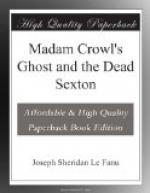Toby Crooke lived in the grey stone house, cold and narrow, that stands near the church porch, with the window of its staircase looking out into the churchyard, where so much of his labour, for many a day, had been expended. The greater part of this house was untenanted.
The old woman who was in charge of it slept in a settle-bed, among broken stools, old sacks, rotten chests and other rattle-traps, in the small room at the rear of the house, floored with tiles.
At what time of the night she could not tell, she awoke, and saw a man, with his hat on, in her room. He had a candle in his hand, which he shaded with his coat from her eye; his back was towards her, and he was rummaging in the drawer in which she usually kept her money.
Having got her quarter’s pension of two pounds that day, however, she had placed it, folded in a rag, in the corner of her tea caddy, and locked it up in the “eat-malison” or cupboard.
She was frightened when she saw the figure in her room, and she could not tell whether her visitor might not have made his entrance from the contiguous churchyard. So, sitting bolt upright in her bed, her grey hair almost lifting her kerchief off her head, and all over in “a fit o’ t’ creepins,” as she expressed it, she demanded:
“In God’s name, what want ye thar?”
“Whar’s the peppermint ye used to hev by ye, woman? I’m bad wi’ an inward pain.”
“It’s all gane a month sin’,” she answered; and offered to make him a “het” drink if he’d get to his room.
But he said:
“Never mind, I’ll try a mouthful o’ gin.”
And, turning on his heel, he left her.
In the morning the sexton was gone. Not only in his lodging was there no account of him, but, when inquiry began to be extended, nowhere in the village of Golden Friars could he be found.
Still he might have gone off, on business of his own, to some distant village, before the town was stirring; and the sexton had no near kindred to trouble their heads about him. People, therefore, were willing to wait, and take his return ultimately for granted.
At three o’clock the good Vicar, standing at his hall door, looking across the lake towards the noble fells that rise, steep and furrowed, from that beautiful mere, saw two men approaching across the green, in a straight line, from a boat that was moored at the water’s edge. They were carrying between them something which, though not very large, seemed ponderous.
“Ye’ll ken this, sir,” said one of the boatmen as they set down, almost at his feet, a small church bell, such as in old-fashioned chimes yields the treble notes.
“This won’t be less nor five stean. I ween it’s fra’ the church steeple yon.”
“What! one of our church bells?” ejaculated the Vicar—for a moment lost in horrible amazement. “Oh, no!—no, that can’t possibly be! Where did you find it?”




